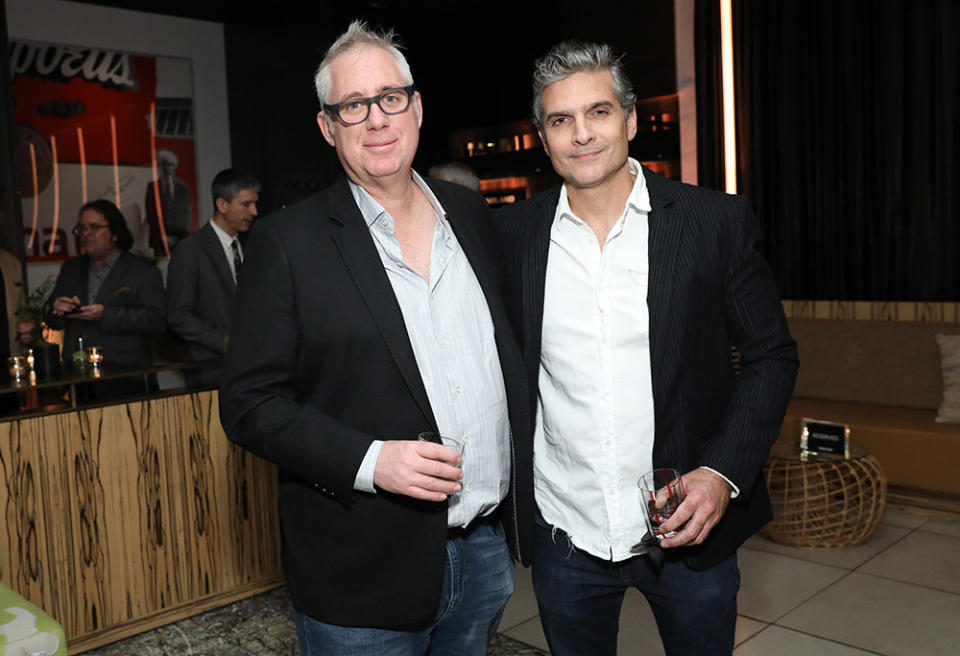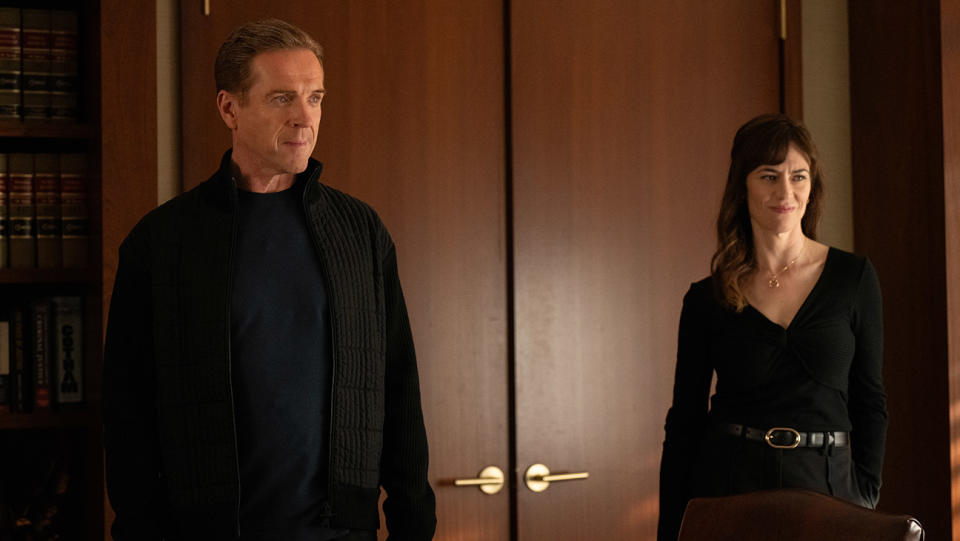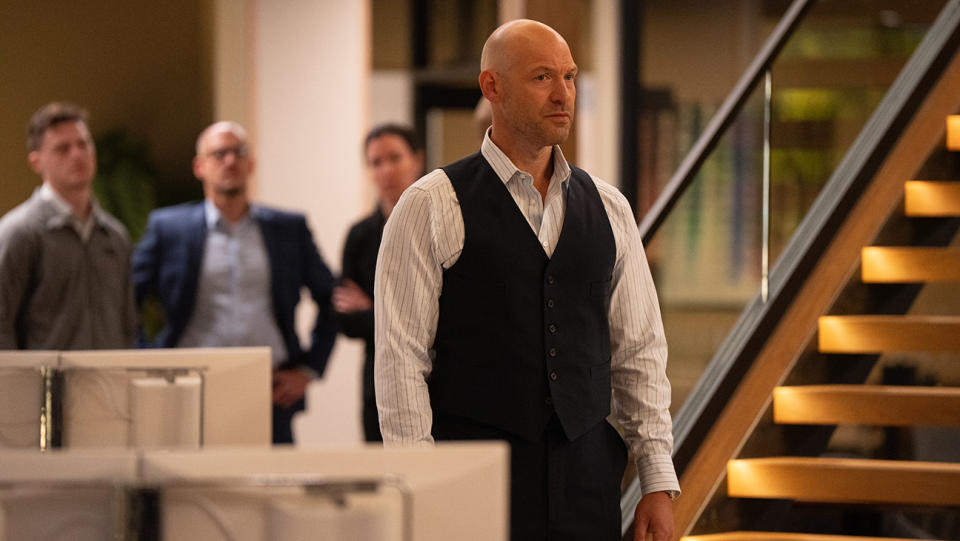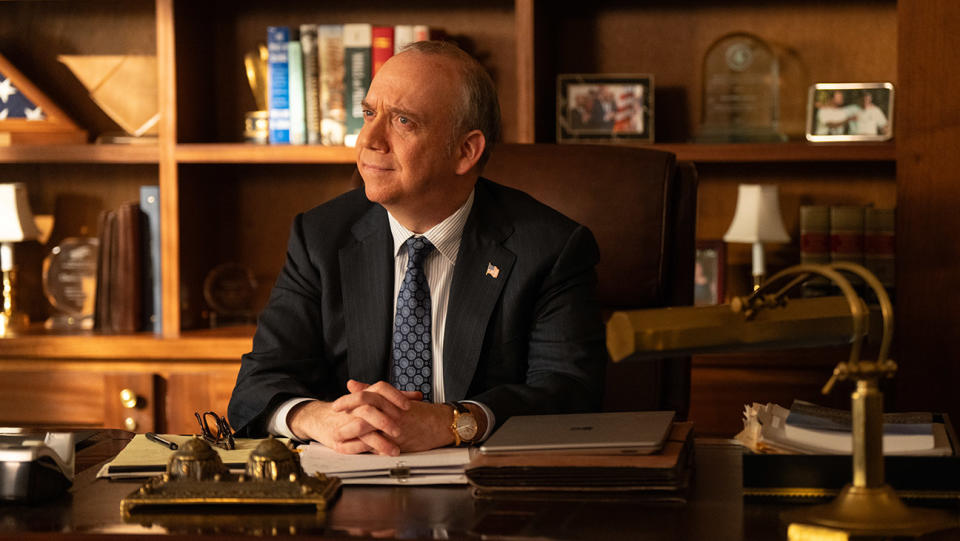“Take the Money and Run”: ‘Billions’ Bosses Break Down That Electric Series Finale
- Oops!Something went wrong.Please try again later.
- Oops!Something went wrong.Please try again later.
- Oops!Something went wrong.Please try again later.

[This story contains spoilers from the series finale of Billions, “Admirals Fund.”]
“Bobbie Sue took the money and run” is not exactly the same as saying “Bobby and Chuck took the money and run,” though “Sue” is not a bad nickname for the crusading lawyer played for seven seasons by Paul Giamatti. Still, the vibes are very much on point as Steve Miller Band’s “Take the Money and Run” played viewers out in the opening and closing moments of the series finale of Billions, which ended a seven-season run with one last signature heist and one last big score for basically every single character — everyone, except for late-game antagonist Mike Prince (Corey Stoll).
More from The Hollywood Reporter
As often is the case with Billions, the final episode, “Admirals Fund,” pulls the curtain back on events from previous episodes, only to reveal that they did not play out exactly as the audience thought. It looked like the holy alliance of Chuck Rhodes (Giamatti), moneymaking Bobby Axelrod (Damian Lewis), mental giant Wendy Rhodes (Maggie Siff) and their compatriots were dead in the water in their crusade to stop egomaniacal billionaire Prince’s historic run toward the White House. The crusaders believed Prince would govern over the globe with dictatorial demeanor, and they were willing to put it all on the line to see him stopped. In the penultimate episode, it looked like their luck had finally run out.
Of course, in classic Billions style, we didn’t have the whole picture.
The finale revealed that critical people in Prince’s camp were plotting against him for weeks, working with Chuck, Wendy, Axe and the rest. Through a series of financial gymnastics best left to smarter people to explain, the “heroes” of Billions (such as they exist in this world) are able to yoink the vast majority of Prince’s wealth away from him and redistribute it among the vast majority of the Billions cast. Prince’s White House run is derailed, and everyone else is either millions and millions of dollars richer, or at least satisfied enough with a job well done.
Indeed, some are satisfied enough to have a job at all, as the Billions finale goes out of its way to tip back to its own past, bringing in old guard characters like Bryan Connerty (Toby Leonard Moore) back into the fold; previously disgraced and sent to prison, Connerty is brought back in by Chuck and Kate Sacker (Dola Rashad) to get his law license back. Seen earlier in the season as a hibachi chef, Connerty gets to take his showy knife skills for one last spin in the very final scene of Billions, as he cooks the Rhodes family a hibachi feast fit for a king, as “Take the Money and Run” sends the show on its way.

It’s about as happy an ending as possible for the characters of Billions. Series creators and longtime collaborators Brian Koppelman and David Levien perhaps take some issue with the idea of “happy,” given what’s actually at stake and what’s actually happening for the people at the heart of this show.
But they take no issue with the idea that the Billions finale — and the final season at large — was crafted with a very specific audience in mind: The “Billions obsessives,” as they describe their core fandom, who stuck around with the electric finance drama for seven seasons, and potentially into multiple spinoffs on the other side.
At this time, Koppelman and Levien are keeping their takes on the reported successor shows, Trillions and Millions, closer to the vest than Rhodes and Axelrod’s scheme to take down Prince. That’s just fine, because there’s so much about the finale as it stands to dig into. Below, they do exactly that in a conversation with The Hollywood Reporter about how the Billions finale came together, including shaping that last scene, and why Damian Lewis’ decision to return after a full season away was the catalyst for the ending’s final shape.
***
How did you arrive upon the final scene: Brian Connerty (Toby Leonard Moore) cooking a hibachi dinner for the Rhodes family? It’s so specific.
Brian Koppelman: It really came together when we were writing the episode. It’s a good insight into the show, and how it was made. Maybe six or seven years ago, Toby Leonard Moore happened to mention to Dave and me that when he was working his way through school, he worked as a teppanyaki chef.
David Levien: When one of our actors tells us about a special skill they have, we file it away to be deployed later. Such as Kate Sacker speaking fluent Italian, because Dola Rashad speaks fluent Italian as well.
Koppelman: A lot of this is not intellectualized. There were a few things we knew. We knew we wanted Connerty to have this moment. Early on, when we brought him back earlier in the season, Dave said to me, “It would be fun if when Connerty says to Sacker — ‘Use me!’ — that Sacker would remember it and would tell it to Chuck, and in that last episode, they get him back his law license.” So we had that idea. Then, I knew I wanted to call back to the noodles moment with Kate from the second episode of the show, the question of dan dan noodles versus sesame noodles. The combination of those things leads to getting us back behind the hibachi grill.
All of these are the things that make Billions what it is. It’s this emotional, heavy moment where you see the Rhodes family are trying to have some sense of being a unit, and while they’re doing that, the surrogate son is back in the form of Connerty. You have all of that stuff going on. But you also have “Take the Money and Run” playing, the greatest song you could possibly have, vibes-wise. There’s also this silliness, our awareness of the absurdity of these people who want for nothing, all of whom are, in so many ways, causing their own problems. These are all people who put various obstacles in their own way because they have various needs to do it psychologically. We have to understand the absurdity of that, and we felt this final episode had to have all of the heart that Billions obsessives come to expect, the people who know every line and catch all the references.

The episode ends on a rather happy note for everyone, except Mike Prince (Corey Stoll). Was the show always sailing toward this upbeat tone as your final note, or were there darker versions of the finale on the table?
Levien: By the time we were writing the finale, we knew there would be a certain amount of wistfulness because there would be a lot of goodbyes and certain moving ons. But unlike The Sopranos where everyone’s getting killed, this show is about people either making money or losing money. Even when people lose all of their money, they aren’t laid low. They have it within them to say they’re going to rise again.
Koppelman: This is what the secret of Billions has always been to us. The reason we don’t have to have a lot of conversations about the tone is because that’s all we did for seven years — talk about the tone, to anyone who ever got involved in the show. Any director, any actor, writer, any cinematographer and editor. We would always say: The thing you need to understand about these people is they only feel alive, or the most alive, when they’re engaged in battles that to them feel existential and very difficult. So it’s funny, that when you say “happy,” I understand what you mean by “happy,” in that it’s not tragic. But if you think about it, Bobby Axelrod ends at a table, and all he’s really learned, after all the time he’s been behind his desk, as he looks at the hungry faces of the pigeons that want to get fed, he says, “Let’s make some fucking money.” So, yes, I understand why you say “happy,” because the song is playing, he’s back in his element, but …
“This feels happy, but happy for who?”
Koppelman: Right. I think it plays a lot with how we as a culture think about the aspirational nature of the kind of lords of business, and we may decry that in certain groups and we may feel the tide is a certain thing. But culturally at our base, as a national sort of spirit, people get a kick out of it. They think they couldn’t be that, but they like watching it. So it feels good but to me, it’s not happy. It’s somebody living a very different life. He should be reading [the buddhist teachings of] Thich Nhat Hanh but he’s not. In a way, actually, Mike Prince gets to say, “You all did me a favor. I get to take this journey back.” And that’s really what the characters on Billions want.
They want to start over.
Koppelman: They want the chance to prove that they’re the most badass mother fuckers on earth.

What were your conversations like with Corey about the ending? Either everyone in that final room was actively plotting against Prince, or bailed at the first opportunity, like his campaign manager Bradford Luke (Babak Tafti). How did you talk with him about playing through Prince’s mindset?
Levien: First of all, Bradford’s like the only character there not of the money world — he’s of politics, which is even more mercenary. But Corey is an amazing actor who played this character and started to embody this guy with a sense of surety and started to not recognize when it was alienating the people around him. Over the course of this season, as he got carried away with his own sense of power, he became vulnerable to everyone wanting to bring him down. But it didn’t come with any convincing of Corey to go through with it. He is a totally committed actor who is very game and he did it with so much dignity and strength. He didn’t try to betray the character or protect himself, because he knows he’s not Mike Prince. He did such an incredible job. He was this worthy foe for all these people together.
Koppelman: One of the things this show was very interested in was: These are all incredibly smart and capable people, but the difference in the outcome for those who lie to themselves about who they are, and those who don’t lie to themselves about who they are. Those who wake up from that lie and try to grow, and those who don’t. When you look at the real-life analogues for these characters and how they get in trouble, it is hubris, almost always. From a sense, their judgment is unerring. You look at all these different moments when really smart billionaires didn’t double check their thinking. Certain sparkly things are placed in front of Prince: The presidency, the power, Camp David. Even for a brilliant and strategic thinker, just look at modern history. Those things work on a guy like that.
Levien: And these are characters whose utter belief in their abilities and instincts have gotten them everything, these outsized rewards, and sticking to their convictions is what’s gotten them there. When they’re slightly wrong and they still stick to their convictions, they end up in a disastrous situation.
They want the chance to prove that they’re the most badass mother fuckers on earth.”
Brian Koppelman
There’s a wonderful moment in the finale when Wags (David Costabile) says, “Endings are hard.”
Levien: It was almost, “Finales are hard.” (Laughs.) We thought we shouldn’t break the wall completely.
Koppelman: But that line was going into this episode no matter what.
Wall-breaking aside, how difficult was crafting the ending of the season? It’s not just a heist on Prince, but a heist on viewers as well, as we learn so many twists from the last few episodes weren’t exactly what we’d been lead to believe they were. How far out did you have to plot the ending? For instance, when Prince throws the computer through the window in the first scene of the season, do you know what’s on the other side?
Koppelman: Oh gosh, yes. Absolutely. That would be impossible. If you threw that computer, and you don’t even know what it means?
Vince Gilligan talks about planting the machine gun in the trunk for the final season of Breaking Bad without knowing what it was going to do…
Koppelman: Yeah, but that guy’s talent. (Laughs.)
Levien: The season was so challenging, but we had so many great weapons at our disposal. At some point before we started, we knew Damian was coming back and originally we thought it was just for a couple of episodes. But then it turned out he could come back for half of the episodes. That gave us great material to work with.
Koppelman: When he told us he could return for more than a couple episodes, he asked us what that would look like. We spent many weeks thinking about that. We had to tell Damian, and in the process, we had to crack the big moments of the finale. You need to be able to say to him, “This is what’s going to happen. Here’s the beginning, middle and end of the season.” We even knew the John Malkovich return would happen in the middle. It gave us goal posts to work toward for the ending.
And by this point, you know you’re not just building toward the season seven finale, but the series finale.
Koppelman: Totally. When he left, Damian said to us, “When you’re making the final season, let me know. I’ll give you what I can.” We talked more and he said, “I can give you six episodes. If you have stuff for me and you think it’s good, then I’m in.” We figured it out, we told it to him on a Zoom, and he loved it. He said, “Let’s rock.”
Levien: The hardest thing about juggling the finale was juggling the goodbyes and resolution with the unfolding plot in a way that would work together. We needed to keep enough winding at the same time. We had a long list of characters we knew we needed to send out in a good way.

The finale not only needs to reveal the plot and say goodbye to these characters, but it has to do so in style. Billions has such a specific tone for so much of the show. Did you feel the finale had to feel sort of classic in that way?
Koppelman: It’s what we were talking about earlier. The show ends with Brian Connerty cooking dinner at a third-tier Benihana knockoff for the Rhodes, his last shift before becoming a lawyer again, and committing to it with everything he has, as that song plays. It is so Billions. If you loved the show? Well, that’s what we mean when we say we made this season for the Billions obsessives. We made it for the people on that wavelength who get the slanted worldview the show has. Things like Axe getting up on a desk and giving a speech, and Chuck looking up at him with this combination of awe, jealousy, love and hatred. It’s all there.
Chuck and Axe say it was a one-off. Could never be done again. You agree?
Levien: I think it’s more optimistic to think Chuck will go back to his office and start prosecuting real cases, and that Axe won’t make himself a target by staying inside the lines.
Koppelman: We love these characters. We understand their faults. This is something Scorsese and Vince Gilligan talk about a lot: you can understand all the ways these people are deeply flawed and do very bad things, but you can’t write them from the inside without loving them, and the actors make that very easy. These actors are so great: Paul Giamatti, Damian Lewis, Maggie Siff, Asia Kate Dillon, Dave Costabile… and Jeffrey DeMunn, who we do not talk about enough; the fact that he doesn’t have an Emmy for this show is the one thing that drives us truly insane. We just love these characters. We want the best for them. We want them to come to their senses. We also know the motor that drives them and how difficult it is for them to achieve being the best versions of themselves.
Brian, a few minutes ago, you said, “one of the things this show was interested in,” already speaking about it in past tense. There are reported spinoffs on the horizon, but at least for now, this is goodbye to a world you inhabited for the better part of a decade. What are you two feeling now creatively as the series closes down?
Levien: It’s been a heavy emotional experience. We had dinner with the main cast. The cast is huge and the relationships we have with these people goes out very far. But it was a large core group we were able to have a dinner with and express ourselves to. It was an incredible night. The cast became super close knit. They became like best friends. To be a part of that, and to say goodbye to them in that way, was really incredible.
Koppelman: As for saying goodbye to it… look, we did empty the clip. We got all the way to Stevie Winwood and Eric Clapton doing heroin together in Blind Faith [as a reference]. I think all of the references, all of the things from that world, it’s all there. We also have had the pleasure in our lives of doing this for so long that the story ends, but it all has a life. If you had told us that Rounders, the first movie we made together, the thing we wrote in a basement, would be as alive for some people 25, 26 years later now? That would have been our crazy wish, and I would’ve had no idea that was really possible. But it doesn’t feel like that movie’s in the past to me. It’s still right here. So, I feel the same way about Billions. That’s the beautiful thing about creating these characters. I can have a conversation with Chuck Rhodes whenever I want.
Interview edited for length and clarity.
Best of The Hollywood Reporter

